SPC David Hickman: Last Iraq War KIA?
82nd Airborne solider David Hickman was the 4474th American serviceman killed in Iraq. He should be the last.
82nd Airborne solider David Hickman was the 4474th American serviceman killed in Iraq. He should be the last.
WaPo (“In Iraq, the last to fall: David Hickman, the 4,474th U.S. service member killed“):
(Courtesy of Zack Zornes) - Army Spec. David E. Hickman, pictured here at Al Asad Airbase in Al Anbar Province, Iraq, was killed in Iraq on Nov. 14, 2011.
Hickman, 23, was killed in Baghdad by a roadside bomb that ripped through his armored truck Nov. 14 — eight years, seven months and 25 days after the U.S. invasion of Iraq began.
He was the 4,474th member of the U.S. military to die in the war, according to the Pentagon.
And he may have been the last.
With the final U.S. combat troops crossing out of Iraq into Kuwait, those who held Hickman dear are struggling to come to terms with the particular poignancy of his fate. As the unpopular war that claimed his life quietly rumbles to a close, you can hear within his inner circle echoes of John F. Kerry’s famous 1971 congressional testimony on Vietnam:
How do you ask a man to be the last man to die for a mistake?
“Thank God if David is the last one to die, because that means nobody else will have to go through this,” said Logan Trainum, one of Hickman’s closest friends. “But it’s crazy that he died. No matter your position on this war — if you’re for or against it — I think everybody thinks we shouldn’t have been over there anymore.”
U.S. combat operations in Iraq officially ended months before Hickman’s unit shipped out from Fort Bragg in May. His platoon spent most of its deployment on “presence patrols,” walking through Iraqi neighborhoods to remind insurgents that the U.S. military was still there, said Spec. Zack Zornes, who served in Hickman’s platoon.
Hickman liked the military, Zornes said. “But there were days on end where me and Hickman would be sitting in his room, being like: ‘Why are we even here? What are we doing?’ We were just doing police work. I totally agree with Hickman’s friends and family who are mad. We had no reason to be there anymore.”
Whatever one thinks of the war—I supported the invasion but have long since argued that it was time to pull the plug on the ensuing nation building folly—the death of a soldier after the announcement that we’re ending the fight is particularly tragic. That the war has been going on since Hickman was thirteen years old and that he volunteered for not only the Army but the airborne infantry fully knowing that he might be called to risk his life in Iraq doesn’t diminish that.
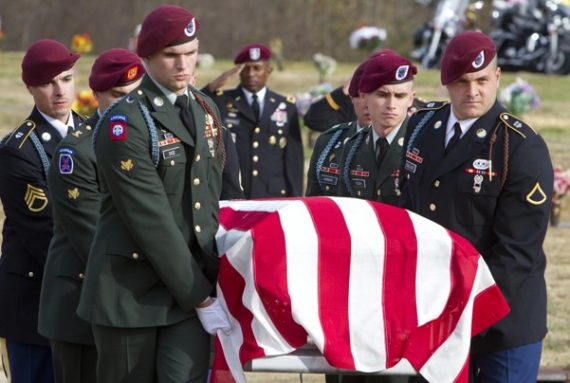
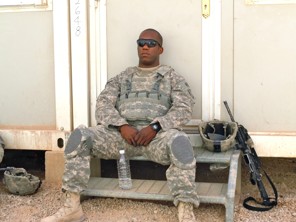



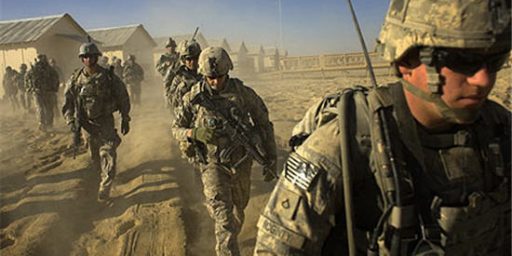
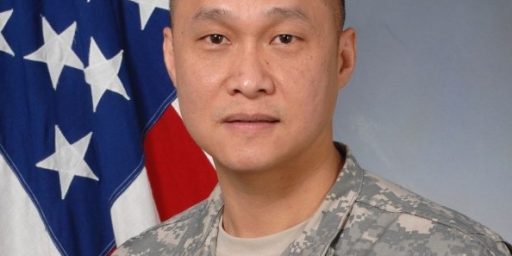
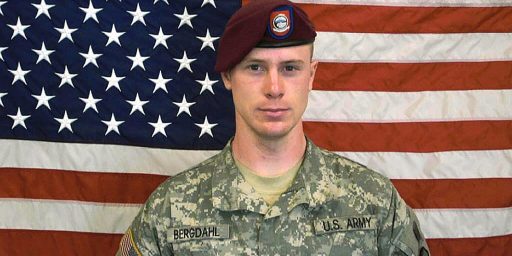
As I look at SPC Hickman I can’t help but think of the Stokely Carmichael quip about the draft.
I’ve revised it for the 21st century
Rest In Peace, SPC Hickman, your death is a much greater tragedy and loss to our country than any number of Hitchens.
—–
What a waste.
@Loviaar: None of this is actually true. Few of our recent wars have been about oil. And our fighting men—each and every one a volunteer— have above average levels of education and are disproportionately drawn from the middle class.
@James Joyner:
Your war (mine also) was solely about oil, before Desert Storm, who knew and gave a Fcuk about Kuwait, yet we shipped 500,000 soldiers and spent billions “defending” their independence, why? This time the oil stealing was couched in terms of fighting terrorism and defending our national security – a much better sales job on a country panicked by 9/11. Finally, compare the number of times we’ve invaded the middle east prior to oil becoming the primary energy source to the number of times since and you’ll see that oil is the major reason why America gives a damm about the middle east.
———-
I’ve never regretted my military service, in fact I look back on it as the best years of my life yet I make no pretense that I “volunteered” for altruistic reasons. I joined out of college in 1986 due to lack of job opportunities; this lack of opportunities was the result of a major recession caused by a Republican president cratering the economy by giving tax cuts to his wealthy friends. Sound familiar.
@Loviaar: There’s not much doubt Desert Storm was about preventing Saddam from cornering a huge chunk of the oil market. Iraq II had no such motivations. Certainly, Afghanistan doesn’t.
The wider economy plays a role in military enlistments and retention. That’s the nature of an all-volunteer force. But 1986 was the start of the Reagan boom–which would really blossom the next year–not a down economy.
Seriously James? It would appear you know less about the oil market than you do about geopolitics.
No wonder you supported this idiotic war. A “huge chunk”?
Atlantic, I can do this for half the price.
@Davebo: The very real fear at the time was that Saddam wouldn’t stop with Kuwait and would invade Saudi Arabia. That’s why they allowed us to stage there. The combination of Iraq, Kuwait, and Saudi Arabia would have constituted something like 40 percent of the working oil fields at the time.